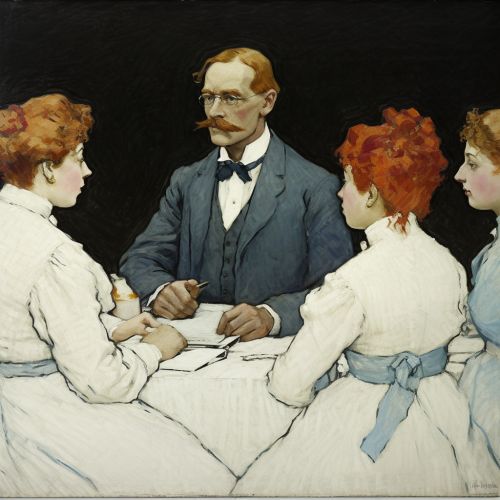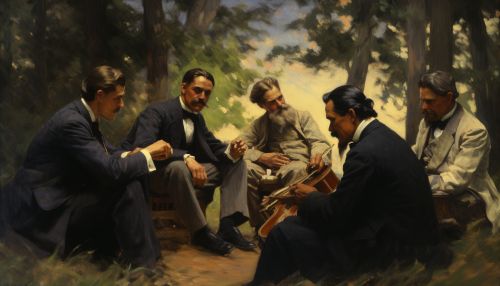Social development theory
Overview
Social development theory is a framework for understanding how individuals and societies change and evolve over time. It is a broad field that encompasses a range of perspectives, including psychological, sociological, and economic theories. Social development theory is used to explain changes in individual behavior, social structures, and cultural norms, as well as the interaction between these elements. It is also used to guide policy-making and intervention strategies in areas such as education, health, and social welfare.
Historical Development
The concept of social development has its roots in the works of early sociologists such as Durkheim and Weber, who were interested in understanding the processes of social change and evolution. Durkheim, for example, proposed that societies evolve from a simple, mechanical form to a more complex, organic form as they become more differentiated and specialized. Weber, on the other hand, focused on the role of ideas and values in driving social change.


In the 20th century, the idea of social development was further developed by theorists such as Parsons and Smelser, who built on the work of their predecessors to create more comprehensive models of social change. Parsons, for example, proposed a theory of social action that emphasized the role of cultural norms and values in guiding individual behavior and social interaction. Smelser, meanwhile, developed a theory of social change that incorporated elements of both structural and cultural analysis.
Key Concepts
Social development theory encompasses a number of key concepts, including socialization, social change, social progress, and social evolution.
Socialization is the process through which individuals learn the norms, values, and behaviors that are expected of them in their society. This process begins in childhood and continues throughout life, and is influenced by a variety of factors, including family, education, peer groups, and media.
Social change refers to the transformation of social structures, cultural norms, and individual behaviors over time. This can occur as a result of a variety of factors, including technological innovation, economic development, political revolution, and cultural shifts.
Social progress is a concept that suggests that societies can improve over time, becoming more advanced, civilized, or enlightened. This concept is often associated with the idea of linear progress, or the belief that societies evolve in a straight line from a state of primitiveness to a state of sophistication.
Social evolution is a broader concept that encompasses both social change and social progress. It refers to the idea that societies evolve over time, undergoing stages of development that are characterized by increasing complexity and differentiation.
Theories of Social Development
There are several major theories of social development, each with its own unique perspective on how and why societies change and evolve.
Structural-Functional Theory
The structural-functional theory of social development, associated with the work of Talcott Parsons, views society as a complex system of interrelated parts that work together to maintain stability and order. According to this theory, social change occurs when there is a disruption in the social system, leading to a process of adaptation and adjustment.
Conflict Theory
Conflict theory, associated with the work of Karl Marx, views social change as the result of conflict between different social groups. According to this theory, social development is driven by the struggle for resources and power, leading to changes in social structures and relationships.
Modernization Theory
Modernization theory posits that societies develop through a process of modernization, moving from traditional, agrarian societies to modern, industrial societies. This theory emphasizes the role of technological innovation and economic development in driving social change.
Dependency Theory
Dependency theory, on the other hand, challenges the idea of linear progress proposed by modernization theory. It argues that development in some countries is hindered by their dependence on more developed countries, leading to a cycle of underdevelopment and poverty.
Applications of Social Development Theory
Social development theory has a wide range of applications in various fields, including education, health, social welfare, and economic development.
In education, social development theory can be used to guide curriculum design and teaching strategies, with the aim of promoting socialization and social skills among students. For example, Vygotsky's theory of social development emphasizes the role of social interaction in cognitive development, suggesting that learning is a social process that occurs through interaction with others.
In the field of health, social development theory can be used to understand health behaviors and to design interventions to promote health and prevent disease. For example, the social determinants of health approach emphasizes the role of social factors in influencing health outcomes, suggesting that improving social conditions can lead to better health.
In social welfare, social development theory can be used to guide policy-making and intervention strategies. For example, the social development approach to social welfare emphasizes the need to address social inequalities and to promote social inclusion and participation.
In economic development, social development theory can be used to understand the social impacts of economic policies and to guide the design of development strategies. For example, the Sustainable Development Goals (SDGs) emphasize the need for a balanced approach to development that takes into account social, economic, and environmental factors.
Critiques and Controversies
While social development theory has been influential in many fields, it has also been the subject of critique and controversy. Some critics argue that social development theory is too deterministic, suggesting that it overemphasizes the role of social structures and neglects the role of individual agency. Others argue that it is too optimistic, suggesting that it overestimates the potential for social progress and underestimates the persistence of social inequalities.
In addition, social development theory has been criticized for its Western-centric perspective, with critics arguing that it imposes Western models of development on non-Western societies. This has led to calls for more culturally sensitive approaches to social development that take into account the diversity of social realities and experiences.
Despite these critiques, social development theory remains a valuable tool for understanding social change and for guiding policy-making and intervention strategies. It provides a framework for analyzing the complex processes of social change, and for identifying the factors that can promote or hinder social development.
